Summary of educational activities on moral and patriotic education in the preparatory group on the topic: "Heroes of the Great Patriotic War"
Gogolova Vera Zakharovna, teacher of MKDOU "Kindergarten No. 11", Jewish Autonomous Okrug, Birobidzhan.Description of material: I offer you a summary of direct educational activities on patriotic education for children of senior preschool age. This material will be useful for teachers of older preschool age. This summary is educational and educational in nature, aimed at patriotic education, love, pride and respect for the Motherland.
Integration of areas:
NGO "Cognitive Development"; NGO “Speech Development” (fiction, speech development); NGO “Artistic and Aesthetic Development” (music, artistic activities); NGO “Physical Development” (physical education); NGO “Social and communicative development” (patriotic development).
Equipment:
Projector, presentation, music, magnetic board, pictures of young heroes, did. game "Make it up from parts."
Preliminary work:
Conversations with children about the Second World War; reading stories about the exploits of heroes in the Second World War; examination of illustrations of heroes, different types of weapons; familiarity with proverbs; memorizing poems; listening to songs about the Second World War; watching video films about the Second World War; did. game “Make parts”:
Target: Education of citizenship and patriotism, spiritual and moral values in children of senior preschool age.
Software tasks:
"Cognitive Development"
To clarify and expand children's knowledge about the courage of soldiers and young heroes of the Great Patriotic War.
"Social and communicative development"
Continue to instill patriotic feelings in children: love, pride and respect for the Motherland, enrich the spiritual world of children through reference to the heroic past of our country and its defenders.
"Speech development"
Continue to work on the development of coherent speech: improve dialogic and monologue speech, consolidate the ability to answer questions in complete sentences.
Move.
“Happy children” (cheerful laughter).
Guys, look who you see on the screen?
What children? (cheerful, joyful). These are happy children.
Look guys at each other. How beautifully you are dressed.
You go to kindergarten, where there are so many toys, soon you will go to school, where you will study. Your beloved mothers and sweets are waiting for you at home. You are also happy children. But it was not always so.
I invite the children to sit down and listen to the poem.
Summer night at dawn
Hitler gave the troops an order
And he sent German soldiers
Against all Soviet people-
This means - against us.
He wanted free people
Turn the hungry into slaves
To be deprived of everything forever.
He ordered them to destroy
They trampled and burned everything,
What we kept together
They took better care of their eyes.
So that we endure need,
They didn’t dare sing our songs,
So that there is everything for the Germans,
For the fascists - foreigners,
But for the Russians, nothing!
War. What a terrible word. War is grief and fear. War is destruction and death.
Guys, how do you understand what war is?
(war is a struggle. The enemy attacks, and the defenders liberate their homeland).
- Who attacked our country? (Fascist Germany attacked our country).
When did this happen? (June 22, 1941).
- What did the fascists want to do to our country? (the fascists wanted to destroy our country and make people slaves).
- What other name can this enemy be called? (fascists, murderers, Germans, Nazis).
- How did they attack our country? (suddenly, swiftly, without warning, treacherously).
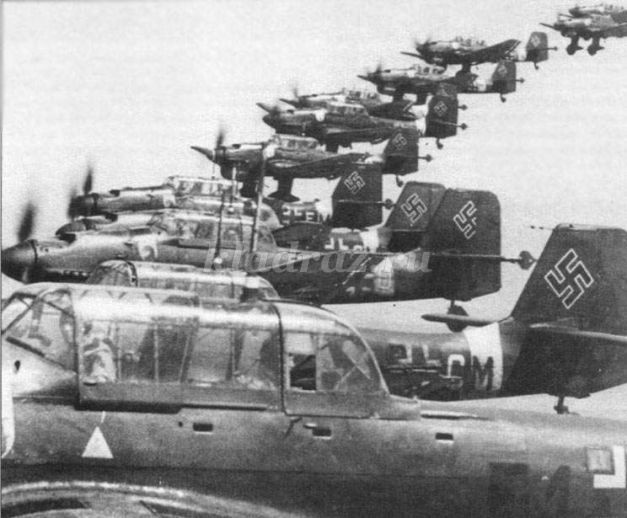
Suddenly, huge forces moved towards our homeland:
Tanks, planes, artillery, infantry. German planes bombed cities, airfields, and railway stations. Bombs flew at hospitals, residential buildings, kindergartens and schools.
“The Nazis walked in the darkness
Behind them moan and cry
And in a fiery red shirt
The fire was spreading like an executioner.”
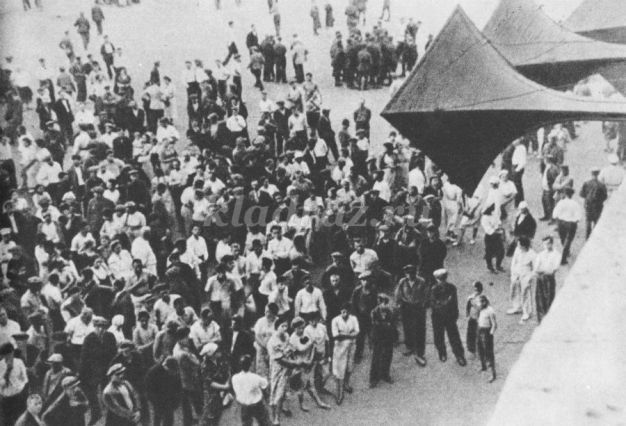
- How did all the people find out about the start of the war? (They reported on the radio about the outbreak of the war).
In those terrible days, the song “Holy War” sounded like an oath to the Motherland. (Listening to the song “Holy War”).
- Where did this song call all our people? (to rise up to fight the fascists, to defend our Motherland).
- Everyone rose up to defend our Motherland. The warriors did not spare their lives to stop the enemy. They fought on land, in the air, and at sea.
- Guys, tell us about what exploits of soldiers do you know?
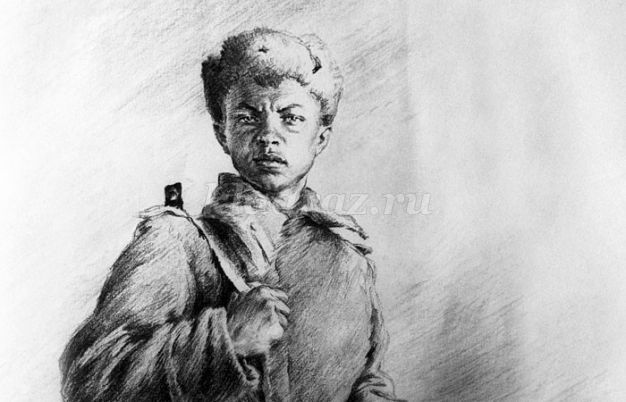
Alexander Matrosov accomplished a feat; he covered a machine gun with his body and died a hero.
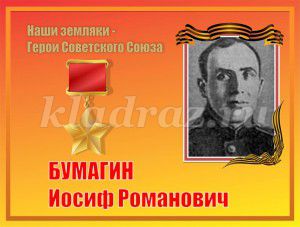
Our fellow countryman Joseph Bumagin repeated the feat of Alexander Matrosov; he covered an enemy machine gun with his body and died. A street in our city is named after him, there is a monument to him, and a memorial plaque.
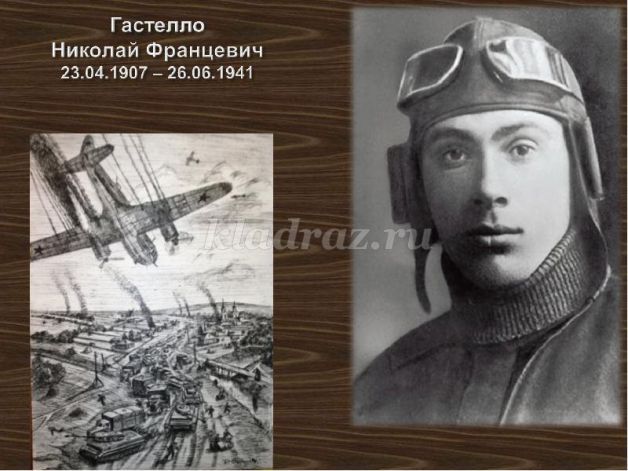
The pilot, Captain Nikolai Gostello, having completed his mission, was returning home in his bomber plane, seeing a column of fascists, tanks, cars on the road below, he crashed into this column and blew them up, but he himself died a hero.
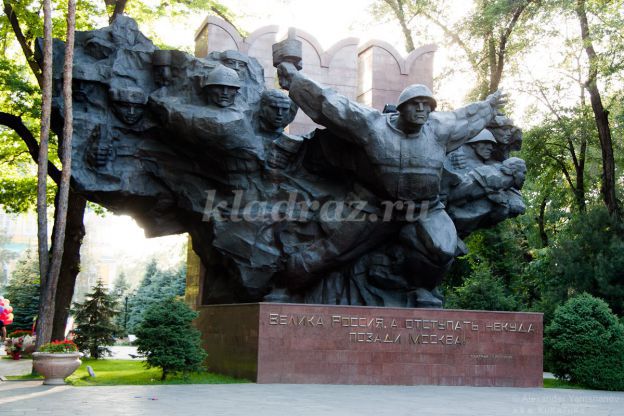
28 Panfilov men held the highway for half a day, preventing the Nazis from breaking through to Moscow. When the tanks came towards them, the seriously wounded commander, tying himself with a bunch of grenades, threw himself under the fascist tank with the words: “Russia is great, but there is nowhere to retreat—Moscow is behind us.” It exploded, destroying the tank. His other fighters did the same. All the soldiers died, but did not allow the enemy to reach Moscow. Now at the site of the battle there is a monument to Panfilov’s soldiers.
Reading a poem by a child:
“But under the fragments in the blood they stood at the line,
They burned enemy tanks, they died - and for love,
And for the country, and for the silence of the forest.”
Children's stories about their relatives who fought in the Second World War (4-5 stories).
Your relatives are the real heroes of our Motherland.” "Heroes never die - they live forever." How do you understand the meaning of this proverb?
(Yes, heroes will never die - they live forever in people’s memory, we remember them and do not forget)
Verbal game “Say the word” (The teacher starts the proverb, the children finish.)
· Hero for the Motherland ..... (mountain)
· Where there is courage, there is….. (victory)
· The brave bullet is not...... (afraid)
· A brave fighter in battle….. (well done)
· One for all and all for one)
- What weapons helped our soldiers fight? And the game “Make it up from parts” will help us answer this question. You can receive an envelope with tasks only after you solve the riddles:
There is an iron whale underwater, day and night the whale does not sleep, that whale has no time for dreams, day and night on duty. (Submarine)
Rides in a car. It suddenly appears and bites painfully. It's called a woman's name (“Katyusha”)
A turtle crawls, a steel shirt. The enemy is in the ravine and she is where the enemy is. (Tank)
The inverted bowler hat helped protect the fighter's head. (Helmet)
You don’t have your own eyes, but it helps you see your enemies. (Binoculars)
I’ll put it under myself, under my head and it’ll remain a place to hide. (overcoat)
It flies without wings and bites without sound. (bullet)
There are black old women sitting on a hill, and if they gasp, people go deaf. (guns)
- Well done, we guessed the riddles quickly and together and we have a physical exercise “Friendly guys”
Friendly guys stood up
They quickly raised their hands up,
To the sides, forward, backward.
Turned right, left
Quietly we sat down to work again.
- And now, I suggest you collect pictures to find out what weapons helped our soldiers fight. Children make pictures.
-Tell me what weapons helped the soldiers fight? (Planes, tanks, guns, machine guns, shotguns, submarines, Katyushas, machine guns).

- Not only adults, but also children fought for the liberation of their homeland.
- Young heroes accomplished many feats.
- How do you understand the expression “Young Hero”? (young)
- Young heroes accomplished many feats, many died, and many still live.
- I suggest you consider the exhibition “Young Heroes”. (On a magnetic board)
- Tell us about the heroes you know and their exploits:
1. Zina Portnova joined the partisans, obtained weapons, and helped the partisans. One day she came across an ambush, she was captured and tortured, but she remained silent. During interrogation, she grabbed a pistol from a fascist and shot him, tried to escape, but she was caught and shot.
2. Lenya Golikov was 14 years old when he captured important documents and was nominated for a hero’s award. He died in an unequal battle.
3. Vitya Korobkov, at the age of 12, joins the partisans with his father and becomes a scout. He is small in stature, inconspicuous, the Nazis do not pay attention to him, but while he is chasing a hoop down the street, he remembers everything: how many soldiers, machine guns, tanks, where they are, and then he told everything to the commander.
4. Bora Kuleshin was 12 years old when his father died and his mother was driven away by the Nazis to Germany. He asks to join the ship as a cabin boy. During the battle, supplies shells and helps the wounded. He was wounded but survived. For heroism he was awarded an order.
5. Vitya Khomenko knew German well. His comrades instructed him to get a job in the officers' mess. He washed the dishes, listened to the conversations of the fascists, and then passed on information to the partisans. The Nazis shot Vitya Khomenko. He died a hero.
- The young heroes were brave, brave, that’s why everyone remembers them.
Reading a poem by a child:
"For the native country people
Gave their lives
We will never forget
Those who fell in valiant battle."
- A terrible war raged for almost 4 years. Our soldiers fought bravely, decisively, not sparing their lives. May 9, 1945 is the day of our Victory over Nazi Germany.
- Guys, how do you understand what victory in a war means? (This means that our soldiers won and liberated our Motherland.)
Poem reading:
"Victory! Victory, soldiers!
Everyone is crying and not hiding their tears...
But can we forget the 45th,
There is a parade on Red Square"
The song “This is Victory Day” is playing.
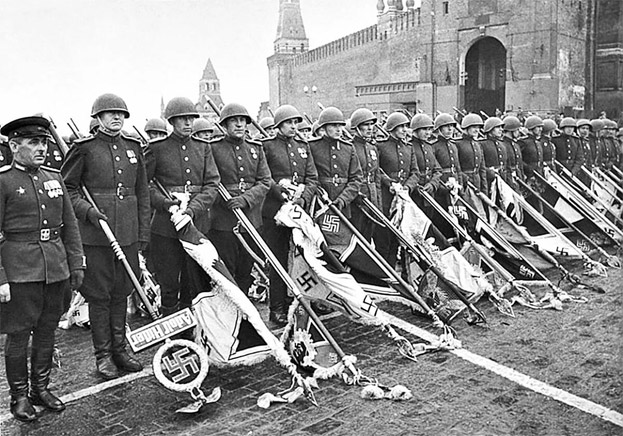
- Yes, guys, that day there was a big parade of winners in Moscow on Red Square. The victorious soldiers walked by in solemn steps, and suddenly a column of soldiers separated from the general formation, turned sharply towards the Kremlin and threw the banners of Nazi Germany at the foot of the line.
Reading a poem by a child:
This area has only known this once before.
Once I saw the earth.
The soldiers dragged the enemy's banners.
To throw them to the foot of the Kremlin.
- Many years have passed since the war ended and peace came. This year our country celebrates the anniversary of the Victory. Tell me guys, how many years since Victory Day are we celebrating this year? (70 years old).
- Yes, guys, we live in peacetime, but we remember and do not forget the heroes who died defending us. Let us children rejoice and take care of this wonderful world in which we live.
The song “Sunny Circle” plays. Children draw rays of the sun with their fingers and give them to all guests.








